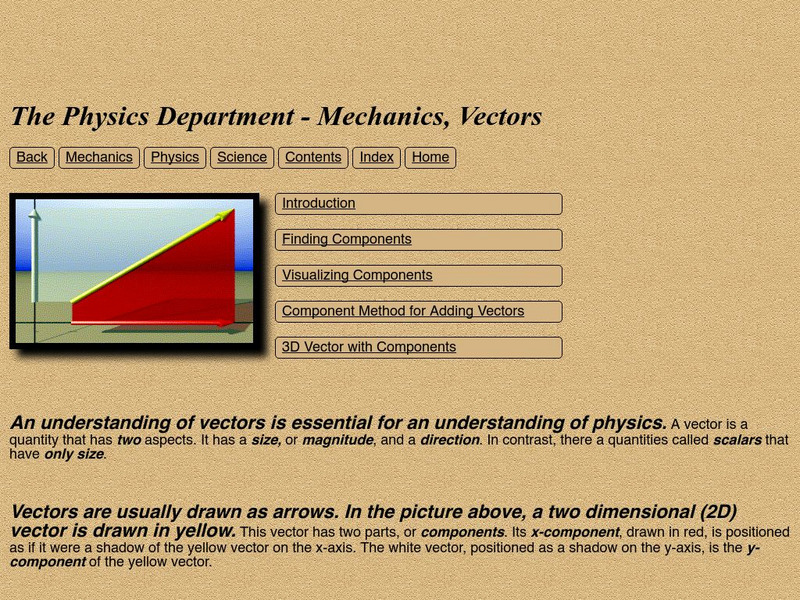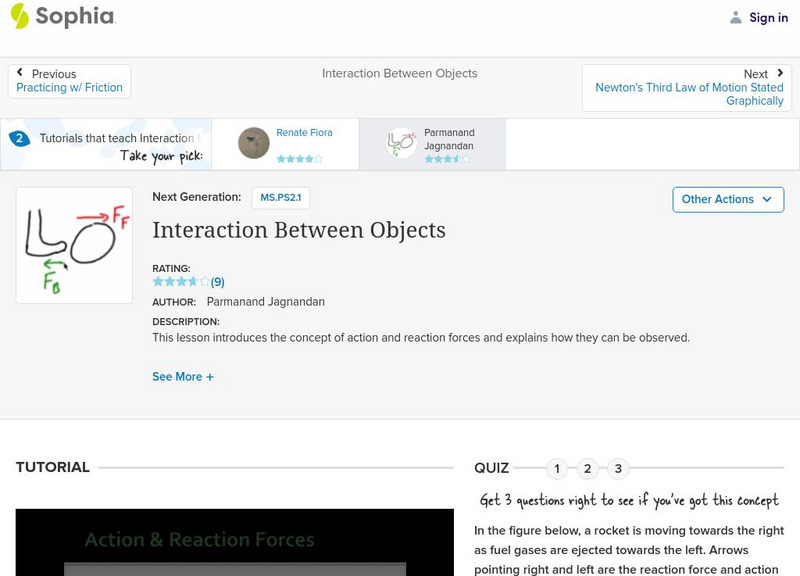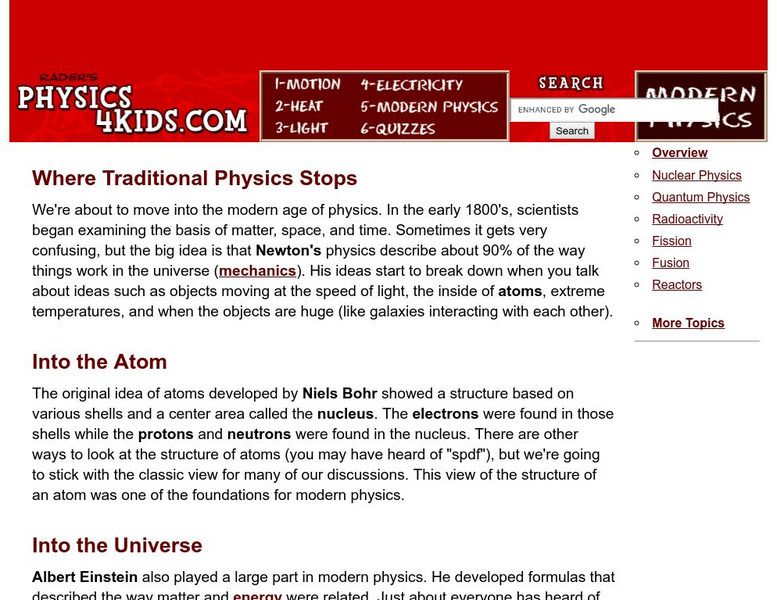Hi, what do you want to do?
Annenberg Foundation
Annenberg Learner: Colliding Cars
Try to predict what will happen in three different bumper car collisions. For each collision, you'll be shown two possible outcomes.
Curated OER
Zona Land: Components of a Vector
An interactive Java applet where users can rotate a vector about its tail and view the components of that vector. Magnitude of the components is updated on screen as the vector is dragged.
CK-12 Foundation
Ck 12 Exploration Series: Simulations: Physics: Loop the Loop
[Free Registration/Login Required] Learn about the centripetal motion in the context of a roller coaster going through a loop-the-loop and over a hill.
CK-12 Foundation
Ck 12 Exploration Series: Simulations: Physics: Tether Ball
[Free Registration/Login Required] Learn about centripetal motion in the context of the game of tether-ball.
Curated OER
Zona Land: Mechanics and Vectors
An exceptional tutorial on the topic of vectors that offers many helpful graphics, some of which are interactive.
Physics Classroom
The Physics Classroom: Momentum and Collisions: Exploding Carts Interactive
Students explore different situations where two side-by-side carts on a low-friction track push away from each other and travel in opposite directions. The goal is to investigate the effects on the relative mass.
CK-12 Foundation
Ck 12: Physical Science for Middle School
This digital textbook covers core physical science concepts and includes interactive features, real world examples, and videos.
Soft Schools
Soft Schools: Physics Quizzes: Force, Mass Acceleration
Assess your understanding of force, mass and acceleration and the relationship amongst the three with this interactive multiple choice quiz. Immediate feedback is offered.
University of Colorado
University of Colorado: Ph Et Interactive Simulations: Gravity Force Lab
Manipulate the mass and distance of two objects to see how these properties change the gravity force.
University of Colorado
University of Colorado: Ph Et Interactive Simulations: Forces and Motion: Basics
Explore the forces at work when pulling against a cart, and pushing a refrigerator, crate, or person. Create an applied force and see how it makes objects move. Change friction and see how it affects the motion of objects.
Physics Classroom
The Physics Classroom: Circular and Satellite Motion: Newton's 2nd Law Revisited
In this interactive module, students use free-body diagrams, Newton's second law equation, and circular motion concepts to analyze a variety of physical situations involving the motion of objects in circles or along curved paths.
Physics Classroom
The Physics Classroom: Charge Interactions
This online tutorial teaches students about the nature of the electric force. In this part of Lesson 1, two simple and fundamental statements will be made and explained about the nature of the electric force.
Physics Classroom
The Physics Classroom: Momentum and Collisions: Collision Carts Activity 1
A virtual collision track with colliding or exploding carts allows students to explore elastic and inelastic collisions. They can vary the mass of the two carts and their pre-collision velocities. An accompanying activity sheet which...
Physics Classroom
The Physics Classroom: Momentum and Collisions: Collision Carts Activity 2
A virtual collision track with colliding or exploding carts allows students to explore elastic and inelastic collisions. They can vary the mass and velocities of the two carts. An accompanying activity sheet which focuses on elastic...
CK-12 Foundation
Ck 12 Exploration Series: Simulations: Physics: Ballistics Tests
[Free Registration/Login Required] Practice with the concepts of conservation of momentum and energy by analyzing a special case of the ballistic pendulum.
Sophia Learning
Sophia: Interaction Between Objects: Lesson 1
This lesson introduces the concept of action and reaction forces and explains how they can be observed. It is 1 of 2 in the series titled "Interaction Between Objects."
Other
Glenn Turner: Gyroscope Math Page
The mathematics associated with gyroscopes can be investigated through this interactive page. Users enter critical parameters about gyroscopes and rotational motion descriptors are given.
CK-12 Foundation
Ck 12 Exploration Series: Simulations: Physics: Bobsled
[Free Registration/Login Required] Learn about centripetal motion in the context of a bobsled on a track. Adjust variables to test how many ways the bobsled can stay on the track in a race with the simulation. Examine potential problems...
NASA
Nasa: Aerodynamics Index
Are you studying or teaching Aerodynamics? This page acts as an index to all the terminology related to this topic. Clicking on any title will open a page with a colored slide and a scientific explanation of the contents. Animated,...
Physics Classroom
The Physics Classroom: Vectors: Double Trouble in 2 Dimensions
In this interactive tutorial, analyze two-body problems in which the objects are moving in different directions.
Physics Classroom
The Physics Classroom: Vectors and Projectiles: The Monkey and the Zookeeper
In this simulation, students pretend to launch bananas from a canon to the monkeys at the zoo. The monkeys sometimes let go of the branch at the exact moment the banana is launched. So the students must determine the correct aim angle...
Physics4kids
Physics 4 Kids: Where Traditional Physics Stops
We're about to move into the modern age of physics. In the early 1800's, scientists began examining the basis of matter, space, and time. Sometimes it gets very confusing, but the big idea is that Newton's physics describe about 90% of...
Georgia State University
Georgia State University: Hyper Physics: Rockets
HyperPhysics site with dealing with the mathematics of rocket flight. The site is interactive and allows the user to input data. This is a rather high level site and, while any student could use it to get answers, to understand some of...
Physics Classroom
The Physics Classroom: Vectors: Forces in Two Dimensions:equilibrium and Statics
Through examples and practice problems, this interactive tutorial helps students understand forces that are in a state of equilibrium with a net force of zero.
















